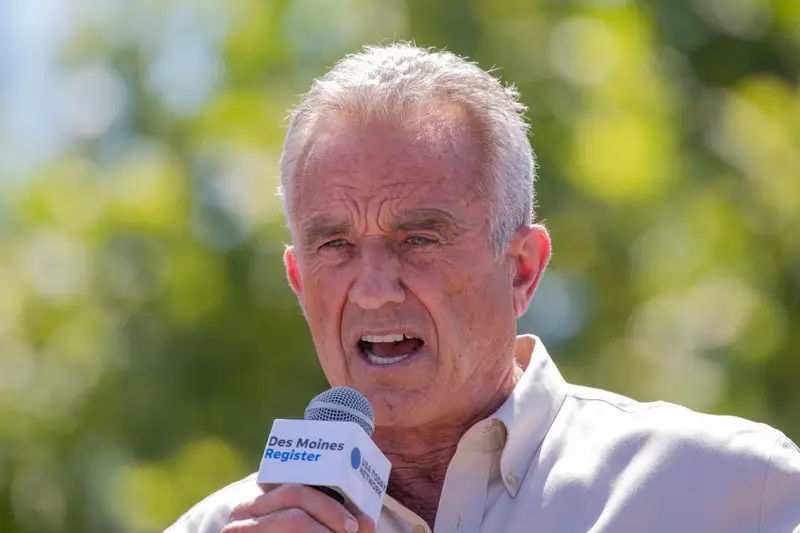Television personality Bill Nye revealed he blocked contact with Health and Human Services Secretary Robert F. Kennedy Jr. after receiving numerous unsolicited text messages promoting vaccine misinformation and autism speculation. The science educator shared details of their correspondence during a recent interview with Men’s Health, published Tuesday, June 10.
Nye displayed what he described as extensive text chains from Kennedy, showing screen after screen of lengthy messages with minimal responses from himself. The two were connected years ago through mutual friend actor Ed Begley Jr., when Kennedy was primarily known for environmental activism rather than his current role in health policy.
The messages from Kennedy contained articles speculating about connections between vaccines, mercury content, and autism – claims that have been thoroughly debunked by medical research. Nye indicated Kennedy demonstrated “just no self-awareness” in his persistent messaging pattern.
Initially attempting diplomatic engagement, Nye responded to Kennedy’s materials by suggesting he had confused causation with correlation. However, Kennedy continued sending what Nye characterized as additional extensive text messages despite the polite pushback. Nye then directly requested that Kennedy stop sending texts, but he ignored this boundary and resumed messaging.
The science educator ultimately decided to completely sever communication with Kennedy. Nye expressed strong criticism of Kennedy’s judgment and suitability for his current position overseeing the nation’s health policies. He emphasized that Kennedy lacks the decision-making capabilities necessary for such a significant governmental role.
This revelation comes amid Kennedy’s recent overhaul of vaccine advisory panels at the Centers for Disease Control and Prevention. Kennedy removed all 17 existing members from the advisory committee and appointed eight new members, many of whom gained prominence during the COVID-19 pandemic for expressing skepticism about government health policies and mRNA vaccines.
Among Kennedy’s new appointees is Dr. Robert Malone, a former mRNA researcher who has promoted controversial theories about COVID-19 vaccines and downplayed deaths related to measles outbreaks. The advisory panel typically maintains 19 members, suggesting additional appointments may be forthcoming.
During his interview, Nye also addressed current public health challenges, particularly referencing a measles outbreak in Texas, where 744 cases have been confirmed since late January. The outbreak occurred within a religious community with historically low vaccination rates.
Nye strongly rejected arguments about individual rights regarding vaccination, emphasizing that unvaccinated individuals typically spread diseases and that public health regulations exist for community protection rather than individual preference. He stressed that vaccination policies protect collective health rights rather than infringing on personal freedoms.
The science educator also criticized growing interest in consuming unpasteurized milk, referencing Louis Pasteur’s foundational work in food safety. Nye expressed bewilderment at the rejection of well-established scientific principles that have protected public health for generations.
Kennedy has faced criticism from both vaccine advocates and anti-vaccine activists during his tenure. Some anti-vaccine supporters criticized him for recommending parents consult healthcare providers about MMR vaccines, while medical professionals have challenged his claims about natural measles immunity compared to vaccine protection.
Dr. Paul Offit from Children’s Hospital of Philadelphia disputed Kennedy’s assertions about measles immunity, noting that measles was declared eliminated in America in 2000 due to successful vaccination programs. Kennedy’s recent “Make America Healthy Again” report has also drawn scrutiny for citing nonexistent studies using AI, which the White House characterized as “formatting errors.”
When contacted for a response to Nye’s comments, a Department of Health and Human Services spokesperson defended Kennedy’s leadership, describing his work as an ambitious public health reform effort grounded in evidence and transparency. The spokesperson emphasized Kennedy’s commitment to serving the American people through his current role.
Nye, who received the Presidential Medal of Freedom from President Biden earlier this year, continues advocating for science-based policy decisions. The 70-year-old educator remains active in public discourse about scientific literacy and evidence-based health policies through his various media appearances and educational initiatives.











